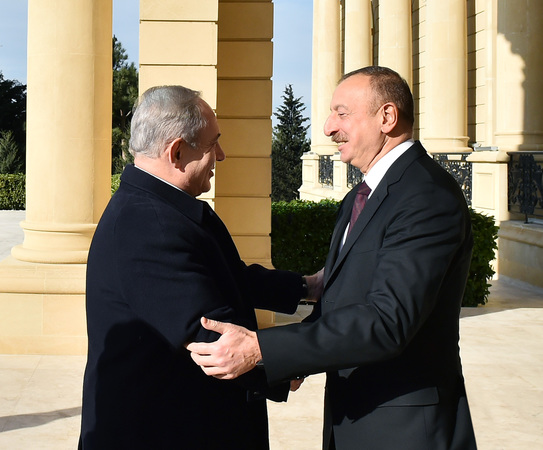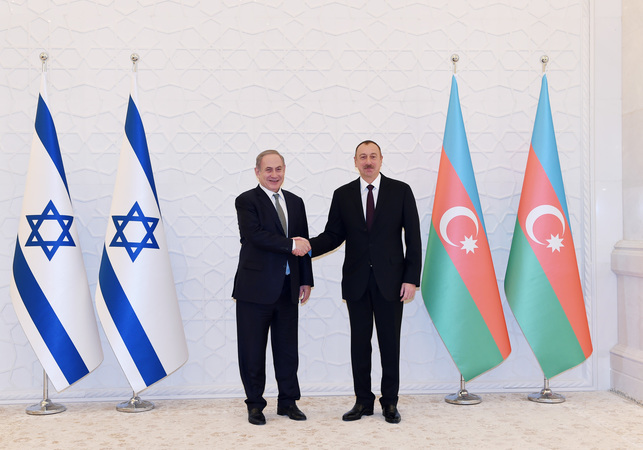The visit of Israeli Prime Minister Benjamin Netanyahu to Baku was another milestone in the Azerbaijani-Israeli relations, which have switched to the level of strategic partnership a long time ago. Thus it is impossible not to draw attention to the evolving global and regional situation, against the backdrop of which Netanyahu's visit to Azerbaijan was held.
Republican Donald Trump's victory in the US presidential elections became a great disappointment to many countries in the world, but this hardly applies to Israel and Azerbaijan. The new US president obviously has warm feelings for the Jewish state and expressed his desire to meet with Netanyahu as soon as possible. Israeli Education Minister Naftali Bennett even said that Trump's presidency would mean "the end of an era of a Palestinian state." Finally, Donald Trump is in favor of the abolition (or at least a major revision) of the Iranian nuclear deal, which the Israelis cannot forgive to the administration of Barack Obama, which completely disappoint them. Differences between Benjamin Netanyahu and Barack Obama were no secret to the public, as well as the White House's sharp criticism of Israeli settlements in the West Bank. Therefore, Tel Aviv hardly lamented the defeat of former Secretary of State Hillary Clinton, who would likely continue the Middle Eastern course of the current administration.

At first, Azerbaijan did not comment the US election race, observing the rules of diplomatic etiquette and elementary political caution. Only after Trump was elected, the Azerbaijani President Ilham Aliyev said that he welcomes the choice of the American people. Aliyev also noted that the Republican won despite the fact that the US media have carried an extremely aggressive campaign against him. Trump's foreign policy theses are positively perceived by the Azeri political elite. First, Baku is interested in a healthy regional competition between the US and Russia, but not in a rigid simultaneous confrontation, reciprocal sanctions and the erection of new barriers between East and West. For small countries as Azerbaijan it is difficult to maintain economic and political stability, as well as navigate between regional and world powers under such conditions. The detente in the Russian-US relations will allow the Azerbaijani diplomacy to use advantages of its traditional multi-vector policy. Second, there is reason to believe that the new administration will decrease the level of the US interference in the internal political processes in the post-Soviet space and the risk of "color revolutions", associated with it. In recent years, the activities of Western institutions and media in the country have been increasingly treated with suspicion by the Azerbaijani authorities, as a result many organizations have been forced to leave the country. The properly developed relations between the new administration and the Azerbaijani government will help the parties to overcome a recent cooling of relations.

The fact that Baku and Tel Aviv decided to "compare notes" right now is quite natural. An inevitable change is coming in the US foreign policy, which will affect the whole world. But Israel has considerable political and economic opportunities and resources in the United States, and after arrival of a new friendly administration to the White House, these opportunities will only increase. Azerbaijan - a Muslim country, which, according to Netanyahu, just "loves Israel" on a par with Kazakhstan - will probably want to take advantage of Israel's "intermediary services" [before arriving in Baku, Israeli Prime Minister visited Astana - VK]. On the other hand, Baku also has something to offer Israel. Azerbaijan is a perfect intermediary for the full restoration of the Turkish-Israeli relations. Turkish President Recep Tayyip Erdogan has repeatedly expressed gratitude to his Azerbaijani counterpart Ilham Aliyev and Kazakh President Nursultan Nazarbayev for their crucial role in the normalization of the Russian-Turkish relations after the downing of the jet. Azerbaijani President Aliyev, who supports close relations with Erdogan, and an "aksakal" of the Turkic world, Nazarbayev, may again play a constructive role in the regional policy and boost the recovery of the Turkish-Israeli relations.

Iran's relatively restrained reaction to the Israeli prime minister's visit to Baku is also noticeable. Although there were calls of certain politicians and religious officials to prevent Netanyahu from visiting Azerbaijan, the whole criticism was substantially less severe than during the visit of Shimon Peres to Baku in 2009. The economic ties between Tehran and Baku, which intensified after Hassan Rouhani's election, Azerbaijan's imports of Iranian weapons, the upcoming launch of the transport corridor 'North-South' and the international detente of the general situation around Iran are factors contributing to mitigation of Iran's position in the Israeli issue.






